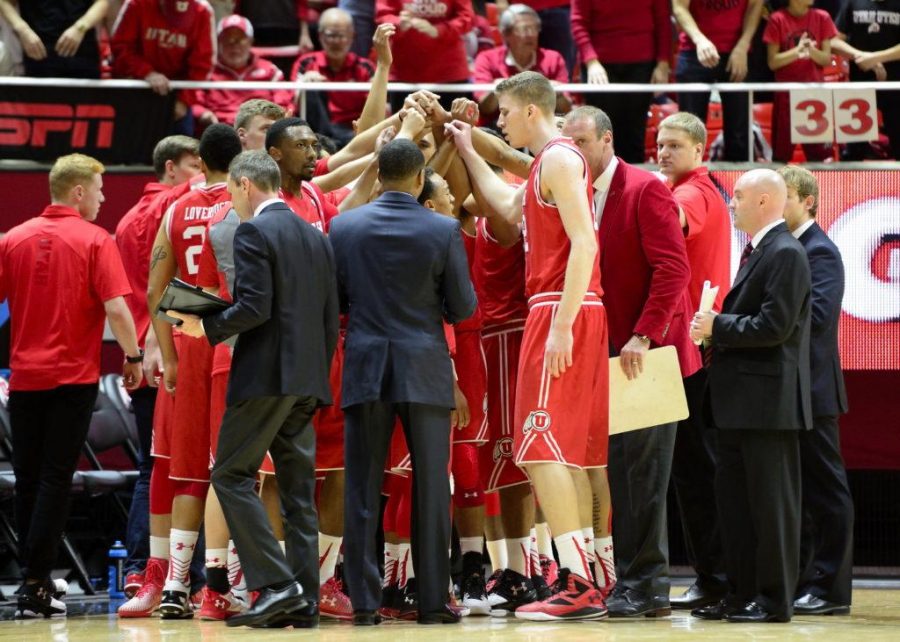The University of Utah Runnin’ Utes are poised to make their highly anticipated debut in the Big 12 Conference. As the nation’s premier basketball league, the Big 12 boasts a staggering five teams ranked in the top-ten of the preseason AP Poll — an all-time conference record.
Facing the likes of basketball blue bloods like Kansas, Houston and Arizona, to name a few, the Utes will undoubtedly encounter fierce competition throughout the season, making this one of the most anticipated campaigns in recent Runnin’ Utes history as they look to make their mark in this elite basketball conference.
Coach Craig Smith has consistently elevated the Utah Utes over the past three seasons, culminating in a NIT Semifinal appearance. However, the team faces a significant challenge this offseason due to the departure of six key rotational players, including their leading scorer Brandon Carlson, who has signed with the Toronto Raptors.
To maintain competitiveness, the Utes aggressively pursued the transfer portal. With a 13-player scholarship roster, Coach Smith aims to implement a “tall-ball” strategy, emphasizing defense and utilizing the team’s size and length to their advantage.
The team’s most notable returner is fifth-year senior sharpshooter Gabe Madsen. Last season, Madsen averaged 13.6 points and 3.9 rebounds per game, playing a key role in the Utes’ NIT run. Over three seasons at Utah, he has steadily improved both offensively and defensively. Madsen set the program’s single-season three-point record with 105 last year. As one of the team’s most experienced players, he’s expected to continue leading in three-point scoring and could potentially top the Utes in overall scoring for the first time in his college career.
Joining Gabe this year is his brother, Mason Madsen, a transfer from Boston College, where he averaged 8.1 points per game in 22 minutes of play.
Three other players are returning to the Utes: seniors Lawson Lovering (6.2 ppg, 4.7 rpg) and Hunter Erickson (4.7 ppg, 2 apg), along with sophomore Jake Wahlin (1 ppg, 2 rpg). Lovering, a 7-foot-1 center, provided solid rim protection off the bench, while Erickson contributed as a backup point guard. Wahlin, a local player from Utah County, saw limited action in 20 games as a freshman and is eager to make an impact this upcoming season. With all the losses from last season it is expected that all of these returning players should see an increase in play this upcoming season.
Aside from those four returners, the 2024-25 edition of Smith’s Runnin’ Utes will look significantly different, relying heavily on transfer talent. The most notable addition is Miro Little, a point guard from Baylor. A highly recruited Finnish player and member of the Finland National Team, Little saw limited minutes as a freshman at Baylor, playing just seven minutes per game and even less in the Big 12 and NCAA Tournaments. Known for his shooting ability, he’s expected to contribute to the Utes’ three-point scoring, which could be one of their biggest strengths this season.
Mike Sharavjamts is arguably the most electric of the portal additions, coming from the University of San Francisco. A sharp-shooting wing from Mongolia, he averaged 7.7 points and 3 rebounds per game. Sharavjamts brings valuable experience, having already played a season each at Dayton and San Francisco and is looking to make an impact in the Big 12.
East Carolina transfer Ezra Ausar is also expected to be an impact starter next season. The junior forward from Atlanta, GA, averaged 11.4 points and 4.7 rebounds per game, with an impressive 51.4% field goal percentage. As a freshman, he earned a spot on the All-AAC Freshman Team. His skill set should translate well for a team that excels in shooting at the Power Four level.
The rest of the incoming transfers will likely play bench roles, but there’s potential among them. Keanu Dawes (6.6 ppg, 4.1 rpg at Rice) is making the jump to the Power Five level after a strong freshman season. Zach Keller (2 ppg, 2 rpg) is looking for a fresh start after limited minutes as a sophomore at Wake Forest. Caleb Lohner (2.4 ppg, 2.3 rpg at Baylor) will likely contribute to the Utah basketball program in some capacity but transferred with the primary goal of playing football in his final year of college.
While the talent is definitely there, it is worth pointing out the team’s potential biggest weakness — chemistry. With as much turnover as the Utes saw from last season, it is expected that the team may experience some growing pains as the players adjust to playing with each other. Being in the almighty Big 12 it is crucial that the team figures this out quick if they want to make an impact this season.
Utah began their season on Nov. 4 against Alcorn State at the Huntsman.



